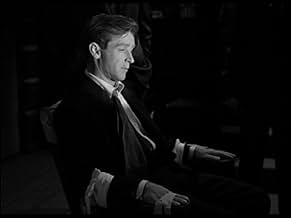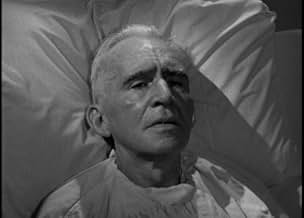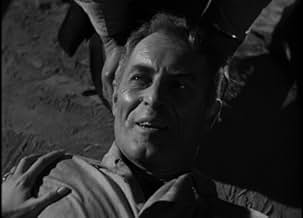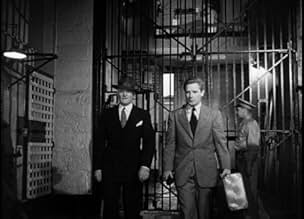CALIFICACIÓN DE IMDb
6.7/10
531
TU CALIFICACIÓN
Agrega una trama en tu idiomaA paroled convict's infatuation with a gold-digger nurse working at a sanitarium leads him to crime.A paroled convict's infatuation with a gold-digger nurse working at a sanitarium leads him to crime.A paroled convict's infatuation with a gold-digger nurse working at a sanitarium leads him to crime.
- Dirección
- Guionistas
- Elenco
Harry Morgan
- Garth
- (as Henry Morgan)
Harry Antrim
- Dr. Stone
- (sin créditos)
Joe Besser
- Cook
- (sin créditos)
Peggie Castle
- Crossroads Tavern Waitress
- (sin créditos)
Stephen Chase
- Bartender
- (sin créditos)
Paul Dubov
- Stick-Up Man
- (sin créditos)
Frank Gerstle
- Stick-Up Man
- (sin créditos)
Anne P. Kramer
- Bertie, the Waitress
- (sin créditos)
Ralph Montgomery
- Bar Customer
- (sin créditos)
Tudor Owen
- Watchman
- (sin créditos)
- Dirección
- Guionistas
- Todo el elenco y el equipo
- Producción, taquilla y más en IMDbPro
Opiniones destacadas
The premise of a convict trying for a fresh start isn't a new one, but I liked the unique characterization or Richard Basehart in Outside the Wall. He plays a young man who's spent more than half his life in prison. While he was a fourteen-year-old in reform school, he beat up a guard (who later died) and was sentenced to murder. After fifteen years, he receives a pardon and is completely unprepared for the outside world. Think about it: the last time he saw the outside, he was a little boy. He's never driven a car, worked at a job, gone on a date, paid bills, or lived on his own. Thrust out into a new world, he gets a job working in a sanitarium and quickly falls for the first blonde who turns his head, Marilyn Maxwell. Dorothy Hart is the brunette nurse with a heart of gold, in contrast to Marilyn's obvious gold digging schemes. Will the innocent protagonist see through her, or will he have to grow up the hard way?
This old movie doesn't feel like it was made in 1950; it feels like it was made in the early 1930s. Everything about it is old-fashioned, from the good girl and bad girl contrast, to the simple filmmaking techniques, to the type of turns the plot takes. I kept expecting Chester Morris to show up with Carole Lombard, Kay Francis, and Shirley Temple. If you like old movies, and especially ex-con movies, try this one out.
This old movie doesn't feel like it was made in 1950; it feels like it was made in the early 1930s. Everything about it is old-fashioned, from the good girl and bad girl contrast, to the simple filmmaking techniques, to the type of turns the plot takes. I kept expecting Chester Morris to show up with Carole Lombard, Kay Francis, and Shirley Temple. If you like old movies, and especially ex-con movies, try this one out.
The story begins at Eastern State Penitentiary, an ancient prison that was shut down in 1971. It's an interesting place you can tour to this day...something you might want to do if you visit Philadelphia.
As to the story itself, it seems that Larry (Richard Basehart) has been incarcerated since he was only 14. Now, after living about half his life behind bars, he's learned that he's received a pardon and will be released. However, Larry has a really difficult time adjusting to life outside prison and you wonder if he'll soon commit some crime just to get back to the routine he's become so used to experiencing.
Before this cane happen, Larry's job offers him a chance to either get rich or go back to stir. A con he recognizes has been brought in to the hospital where Larry works and the guy apparently was part of some armored car robbery...and he was never caught and the money is still in hiding. Soon 'friends' of this con approach Larry and they want him to join up. Will Larry go the straight and narrow or give it all up for a familiar life of crime?
This movie is exceptional in many ways. The script is intelligent and well constructed. It gives an unusual insight into the plight of ex-cons and their difficulties adjusting to real life. It also is very tense and filled with bad people and a real femme fatale. Basehart is also excellent...and his forte was playing in film noir movies. Overall, a surprisingly good movie...one crime film buffs should really enjoy.
As to the story itself, it seems that Larry (Richard Basehart) has been incarcerated since he was only 14. Now, after living about half his life behind bars, he's learned that he's received a pardon and will be released. However, Larry has a really difficult time adjusting to life outside prison and you wonder if he'll soon commit some crime just to get back to the routine he's become so used to experiencing.
Before this cane happen, Larry's job offers him a chance to either get rich or go back to stir. A con he recognizes has been brought in to the hospital where Larry works and the guy apparently was part of some armored car robbery...and he was never caught and the money is still in hiding. Soon 'friends' of this con approach Larry and they want him to join up. Will Larry go the straight and narrow or give it all up for a familiar life of crime?
This movie is exceptional in many ways. The script is intelligent and well constructed. It gives an unusual insight into the plight of ex-cons and their difficulties adjusting to real life. It also is very tense and filled with bad people and a real femme fatale. Basehart is also excellent...and his forte was playing in film noir movies. Overall, a surprisingly good movie...one crime film buffs should really enjoy.
Larry Nelson (Richard Basehart) is a 29 year old convict who wins his plea for a pardon. But "outside the wall" freedom is initially not so sweet. He was in a reform school at 14 - he describes himself as an incorrigible hood at that age - and when a guard who dislikes him hits him, he hits him back, the guard falls and dies, and Larry is convicted of murder but given life in prison instead of death because of his young age. So he is free with 672 dollars he has earned over the course of his imprisonment (that would be about 12 thousand dollars now), but he has never been on a date, never taken a drink, never driven a car or learned how, never applied for a real job. After a couple of days of bad experiences in the city, he hits the road and "tramps it" to a small town and gets a job as a lab assistant in a hospital for TB patients, hoping just to keep his head down and stay out of trouble. On the way to the small town, he reads about a one million dollar robbery in which three of the robbers were killed and three armored car guards were killed. Two robbers escaped.
And then one of the robbers shows up at the rest home with a bad case of TB. Larry recognizes him from his time in prison, but true to the prison code, tells him he will not rat him out. The robber asks him to help him get some of the robbery loot to his wife in Philadelphia. Larry refuses to help. At first. But then he starts pining for a nurse who is money hungry bad news, and he thinks that some of the robber's money will win her affection, so he agrees to help the ailing robber. Complications ensue.
I would normally be annoyed by somebody who makes the obviously bad and even stupid choices that Larry Nelson makes in this film, figuring that any intelligent 30 year old should know better than to trust such a greedy woman as the nurse he lusts after or the murderous robber who wants his help. But then, Larry Nelson experientially is 14, not 30. Thus he makes the mistakes that any 14 year old would make in the same situation. But he learns fast.
This was really a great part for Basehart. I believe him as the hardened con and I believe him as the naive teenager in a 30 year old body. If you want to see Basehart in another film where he practically has a dual role, watch "Tension". But by all means do see this, as it has suspense, noirish undertones, and a great performance by Basehart.
And then one of the robbers shows up at the rest home with a bad case of TB. Larry recognizes him from his time in prison, but true to the prison code, tells him he will not rat him out. The robber asks him to help him get some of the robbery loot to his wife in Philadelphia. Larry refuses to help. At first. But then he starts pining for a nurse who is money hungry bad news, and he thinks that some of the robber's money will win her affection, so he agrees to help the ailing robber. Complications ensue.
I would normally be annoyed by somebody who makes the obviously bad and even stupid choices that Larry Nelson makes in this film, figuring that any intelligent 30 year old should know better than to trust such a greedy woman as the nurse he lusts after or the murderous robber who wants his help. But then, Larry Nelson experientially is 14, not 30. Thus he makes the mistakes that any 14 year old would make in the same situation. But he learns fast.
This was really a great part for Basehart. I believe him as the hardened con and I believe him as the naive teenager in a 30 year old body. If you want to see Basehart in another film where he practically has a dual role, watch "Tension". But by all means do see this, as it has suspense, noirish undertones, and a great performance by Basehart.
In the Hollywood of late '40s and early '50s, Richard Basehart found plenty of work in the noir cycle but never made a major mark, the mark of a Robert Mitchum or Glenn Ford or even a Dick Powell. His good looks were all-American bland - lackluster - and his acting rarely leapt to dangerous voltages. Probably more at home on stage than on the pitiless screen, he leaves one of his fullest performances in a shunted-aside noir, Outside The Wall.
Just 30 but with 15 years in stir behind him (he'd caused the death of an abusive guard when he was just a kid in reform school), he secures an unexpected release from prison. An old lifer grumbles about life outside: `Everybody's got the jitters. A buck ain't worth a buck anymore.' But mo st of all he warns about the `dames,' of whom Basehart knows absolutely nothing. He'll soon find out.
In his first night in Philadelphia, a B-girl feeds him his first taste of liquor and tries to filch his wallet; later, washing dishes, he foils a stickup and, fed up with Brotherly Love, heads for the clean country of Jewel Lake, landing a job as a lab technician at a TB sanitarium. His first patient (John Hoyt) turns out to be an ex-con he knows who's just pulled a fatal armored-car robbery. When Basehart fails to blow the whistle, the dying Hoyt trusts him enough to mule payoff money to his avaricious wife (Signe Hasso).
The straight-arrow Basehart normally wouldn't dirty his hands, but the blonde and mercenary charms of nurse Marilyn Maxwell lead him to rethink his monkish life (`I just found out what money can buy,' he tells her, forking over a platinum bracelet in his new roadster). Still, his stirring conscience beckons him to fess up about his past to good-gal Dorothy Hart. But Hoyt has the means to hold him to his bargain, while his wife and her ruthless accomplices have their own plans for him....
Crane Wilbur, who started way back in the silent era, wrote several noirs and directed a few of them, mostly about prison life (Canon City, The Story of Molly X). Here, he directs his story with some nicely observed vignettes about the dislocation awaiting released felons but, as it advances, less than persuasive plotting. But, in addition to the convincing work he coaxes from Basehart, he assembles a solid cast, with Maxwell and Hasso rivaling one another in duplicity and Hart more appealing than the saintly simp she might have been.
Harry Morgan also appears, as a thug who elicits information by sliding scalpels under fingernails. Interestingly a veteran of even more noirs than Basehart, Morgan played the heavy the year before, too, in Red Light, but couldn't hold a candle to his partner in crime, Raymond Burr. Here, he takes his place amid a balanced cast with intersecting motives that result in a movie that, while satisfying, falls well short of spectacular. Still, it merits more viewers.
Just 30 but with 15 years in stir behind him (he'd caused the death of an abusive guard when he was just a kid in reform school), he secures an unexpected release from prison. An old lifer grumbles about life outside: `Everybody's got the jitters. A buck ain't worth a buck anymore.' But mo st of all he warns about the `dames,' of whom Basehart knows absolutely nothing. He'll soon find out.
In his first night in Philadelphia, a B-girl feeds him his first taste of liquor and tries to filch his wallet; later, washing dishes, he foils a stickup and, fed up with Brotherly Love, heads for the clean country of Jewel Lake, landing a job as a lab technician at a TB sanitarium. His first patient (John Hoyt) turns out to be an ex-con he knows who's just pulled a fatal armored-car robbery. When Basehart fails to blow the whistle, the dying Hoyt trusts him enough to mule payoff money to his avaricious wife (Signe Hasso).
The straight-arrow Basehart normally wouldn't dirty his hands, but the blonde and mercenary charms of nurse Marilyn Maxwell lead him to rethink his monkish life (`I just found out what money can buy,' he tells her, forking over a platinum bracelet in his new roadster). Still, his stirring conscience beckons him to fess up about his past to good-gal Dorothy Hart. But Hoyt has the means to hold him to his bargain, while his wife and her ruthless accomplices have their own plans for him....
Crane Wilbur, who started way back in the silent era, wrote several noirs and directed a few of them, mostly about prison life (Canon City, The Story of Molly X). Here, he directs his story with some nicely observed vignettes about the dislocation awaiting released felons but, as it advances, less than persuasive plotting. But, in addition to the convincing work he coaxes from Basehart, he assembles a solid cast, with Maxwell and Hasso rivaling one another in duplicity and Hart more appealing than the saintly simp she might have been.
Harry Morgan also appears, as a thug who elicits information by sliding scalpels under fingernails. Interestingly a veteran of even more noirs than Basehart, Morgan played the heavy the year before, too, in Red Light, but couldn't hold a candle to his partner in crime, Raymond Burr. Here, he takes his place amid a balanced cast with intersecting motives that result in a movie that, while satisfying, falls well short of spectacular. Still, it merits more viewers.
10clanciai
Richard Baseheart never competed with such mega stars as Gregory Peck, Humphrey Bogart and John Wayne but kept more to himself concentrating on more complicated roles on a smaller scale, like a kind of understatement actor, but the result is that his roles are always interesting and intriguing. Here he is released from prison after fifteen years at the age of 29 and knows nothing about society. His only schooling in 15 years' imprisonment has been to handle tough guys and ruffians and a thorough knowledge of the criminal type. To get away from the stress and noise of Philadelphia, he heads for the country and finds a small friendly town where nothing ever happens, where he is employed as an assistant at a hospital. So far so good, but it is not. An old fellow gangster turns up in a dying state who has hidden a million away somewhere, and the fellow hoodlums he has fooled are after him, so he is not allowed to die in peace. Unfortunately Richard Baseheart is there, they recognise each other, and the case is cooked. From there on the strain and excitement of the thriller keeps constantly rising like a fever temperature, and a few dames get involved also. This is in many ways the perfect thriller, but Richard Baseheart's acting is what keeps it glowingly alive until it bursts into flames, and the finale is an ingenious climax of the composition.
¿Sabías que…?
- TriviaJoe Besser appears uncredited as a the diner owner who is held up at gun point early in the film. He later gained fame as a member of the Three Stooges briefly from 1957-59.
- ErroresAt the end of the film when dying criminal Jack Bernard (played by John Hoyt) falsely and vindictively attempts to incriminate Larry Nelson (Richard Basehart) to the police as being his former accomplice in the armoured car robbery, all Larry would have had to do in order to clear himself would be to have his true identity verified by the authorities of the Philadelphia prison from which he had recently been released.
- Citas
Charlotte Maynard: You've got hands like iron. A girl wouldn't have much chance if you really got sore.
Selecciones populares
Inicia sesión para calificar y agrega a la lista de videos para obtener recomendaciones personalizadas
- How long is Outside the Wall?Con tecnología de Alexa
Detalles
- Fecha de lanzamiento
- País de origen
- Idioma
- También se conoce como
- Outside the Wall
- Locaciones de filmación
- Eastern State Penitentiary - 2124 Fairmont Avenue, Filadelfia, Pensilvania, Estados Unidos(early exterior and interior scenes)
- Productora
- Ver más créditos de la compañía en IMDbPro
- Tiempo de ejecución1 hora 20 minutos
- Color
- Relación de aspecto
- 1.37 : 1
Contribuir a esta página
Sugiere una edición o agrega el contenido que falta

Principales brechas de datos
By what name was Yo fui presidiario (1950) officially released in India in English?
Responda



































